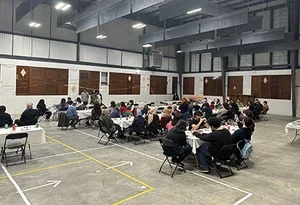Breaking Fast to Build Connection
Earlier this month, students, staff, and faculty from Bennington College joined families of Afghan refugees living in the Bennington area for a night of food and connection.
By Walter Greene '23

To feed a fasting person is a deeply meaningful and supportive gesture.
Iftar—the daily breaking of the fast observed, often communally, during the holy Islamic month of Ramadan—allows this practice in connection and care to take place in a shared setting.
The potential of iftar to gather people together and encourage dialogue in a context of support is what inspired Mohammad Tanvir Anjum ’25, a Bennington College sophomore and house chair, to host an iftar gathering at Bennington’s campus earlier this month.
As the sun set on the first day of April, I joined students, staff, and faculty from the College as we walked into a festively-lit Student Center to join families of Afghan refugees located in Bennington County and Brattleboro. Also in attendance were town officials and representatives from ECDC and Bennington County Open Arms, two agencies that oversee the resettlement of these families.
ECDC offers case management support in Bennington and Brattleboro, directly overseeing the resettlement of refugees and providing or connecting them with their immediate and long-term needs. In Brattleboro, their multicultural center provides ECDC’s resettled families with services including English as a Second Language, driving lessons, yoga, and access to counselors and psychiatrists. Bennington County Open Arms also works to secure essential resources for these families such as housing and funding.
Yet a large part of both these agency’s work is to provide not just the material reality of being at home in Bennington, but the vital, emotional reality of feeling at home too.
The necessity of feeling a sense of connection with the community is an essential part of resettlement. As a refugee from Afghanistan and the Refugee Leadership Coordinator for ECDC, Sohaila Nabizada offers a perspective on resettlement informed by personal experience and the practical understanding of how resettlement agencies operate. As we worked together to string up the last of the lights before dinner, Nabizada described her experience on first arriving in Vermont in January of 2022:
“At the beginning it was a bit tough, because I was a single female just traveling by myself. I came from a big city. [Bennington] was very local for me.”
Nabizada continued to describe how it was through exploring and finding out more about the local community and its people, and the support both had to offer, that she began to feel settled and happy in the area.
In terms of the extent to which Bennington College and agencies like Nabizada’s can support this process of helping these families of refugees feel at home, Nabizada explains how participating in and hosting events like this iftar at Bennington are a valuable place to start:
“There are some people and some families that do not have the chance to meet each other and go to each other, so these types of events are very important,” said Nabizada. “We’re trying to give people a clear picture of how it looks when they are in the community, how supportive the community is, how people are excited to welcome them, in any place possible.”
Eduardo Melendez, the Community Engagement and Communications Manager of ECDC, shared a similar view when I spoke with him after the dinner. Melendez advocates for the value of these types of community engagements as an opportunity to observe how the resettled families are changing and adapting to our culture, and how Vermont is, in turn, going through a very interesting cultural interaction of its own:
“That cultural connection is happening, that bonding of the community is happening,” said Melendez. “Everyone is invested in what is going on. This is what community is. It’s not only about welcoming, but partaking.”
Participating in this network of support, discovery, and connection is the key to providing these families with the resources and experiences they need to be at home in Bennington County and the surrounding area. Tanvir’s goal in hosting the iftar was to strengthen Bennington College’s position within this network of refugee support currently sustained by ECDC and Bennington County Open Arms. Speaking with him the day after the event, he felt encouraged by the evening’s success and the connections that were made.
“The intent was to bring all these people together, the people who need the support, the people who can provide the support. All these people who have a multitude of resources in their hands that they can provide to the Afghan community. Whatever conversation happened there is [most] valuable,” said Tanvir.
Through the collective and supportive setting of iftar, Tanvir sought to create a string of opportunities and connections from which the families, ECDC, Bennington College, and Bennington County Open Arms can now move forward.